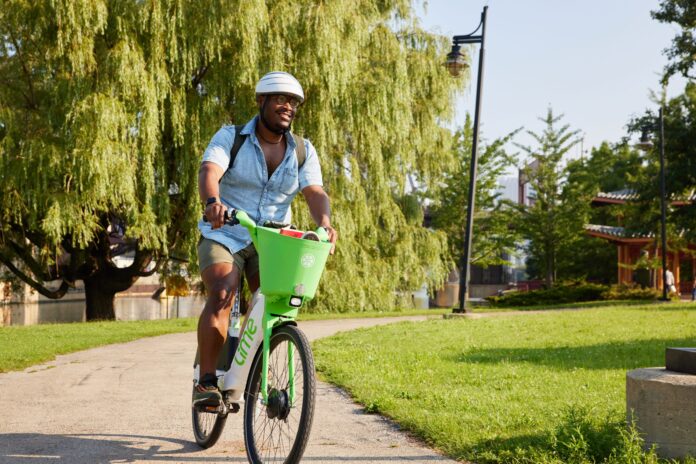Since debuting in Atlanta in 2018, Lime has helped shift the city’s car-centric transportation landscape toward a more sustainable and accessible future by introducing micromobility options such as scooters and e-bikes.
Lime has facilitated nearly 5 million rides for over a million customers in just six years, making the company a major player in Atlanta’s transportation ecosystem. Earlier this year, Lime piloted its new LimeBike in Atlanta to overwhelmingly positive results — it’s becoming increasingly clear that for short distances, Atlanta’s future is on two wheels.

“Our goal is to serve as much of Atlanta as possible to replace 1-5 mile trips,” says Carol Antunez, Senior Manager of Government Relations at Lime. “We consistently deploy vehicles throughout the city to ensure there is availability throughout.”
While electric bicycles may not be suitable for highways like I-75, micromobility plays a crucial role in easing transportation challenges in urban settings, such as the Atlanta Beltline, and in providing seamless first- and last-mile connections near shopping centers and MARTA stations. Lime is actively partnering with MARTA to strategically identify parking locations that ensure a consistent supply of bikes near transit hubs. This effort aims to eliminate the need for travelers to rely on cars for these short yet vital connections. “A significant portion of our rides start or end at or near public transit stations worldwide,” notes Antunez, highlighting Lime’s commitment to integrating micromobility with public transit networks.
Electric scooters and e-bikes are hardly a novel sight in metropolitan areas. However, Lime has earned its popularity among Atlantans by consistently demonstrating a commitment to excellence in vehicles, service, and maintenance. Instead of settling for what’s available, Lime gives you the choice to select the best possible vehicle for your trip — and a high-quality and fully charged one, at that.
“If our vehicles are out in the field, that means they’re likely charged enough to get where you’re going,” Antunez says. Lime’s app lets you check a vehicle’s battery level before unlocking it, ensuring a worry-free ride without the inconvenience of a depleted battery. To enhance sustainability, Lime not only recharges batteries in their warehouse but also is piloting the use of electric vans to swap them citywide, making the entire process efficient, eco-friendly, and convenient for riders.
No matter what kind of short-distance trip you’re taking, Lime has a vehicle suited to your needs. Lime’s seated scooters, or the new LimeBike, for example, offer additional storage that can hold groceries or deliveries. Meanwhile, the E-Bike provides a boost if you’re traveling up a steep hill or in a hurry for a meeting, date, or even a shift at work.

“Our service is widely popular with residents and visitors across industries, whether it’s hospital or hospitality staff commuting early in the morning or late at night, or moving people to and from their 9-5,” Antunez says.
Those who commute short distances for work or school during less traditional hours can benefit from Lime as well, especially since Atlanta recently extended hours of operations for micromobility . Lime’s Access Program provides a significant discount to anyone who receives federal, state, or city subsidies — these vehicles are not luxuries reserved for the upper class or tourists, but instead, the people who know Atlanta best and keep the city going. “Our riders look like the cities we serve, including in Atlanta,” Antunez says.
All of these conveniences — sufficiently charged batteries, a variety of bikes and scooters to fit your needs, affordability, and the ability to get where you need quickly, without enduring Atlanta’s infamous traffic — show how increased micromobility can change cities like Atlanta. “Micromobility has the potential to solve many of the transportation issues that cities consistently struggle with, like connecting neighboring communities outside of major transportation hubs,” Antunez says. Just look at how many Atlantans are already embracing these sustainable and streamlined methods of transportation and how much easier their lives are because of it. Micromobility in Atlanta has made that possible.

Beyond transportation, Lime actively invests in Atlanta’s community. Through the Lime Hero program, riders can round up their fares to support local nonprofits like Big Brothers Big Sisters of Metro Atlanta and the Atlanta Beltline Partnership, both aligning with Lime’s mission of fostering community connections. At events like Propel ATL’s Streets Alive, Lime hosts a tent offering free helmets, Lime swag, and First Ride Academy sessions, where attendees learn safe riding practices and test Lime’s vehicles.
By prioritizing affordability, sustainability, and community engagement, Lime is helping Atlanta reimagine urban transportation. “Micromobility has the potential to solve many of the transportation challenges cities face, like connecting neighboring communities and reducing reliance on cars,” says Antunez. As Atlanta embraces this vision, Lime is proud to lead the charge.
